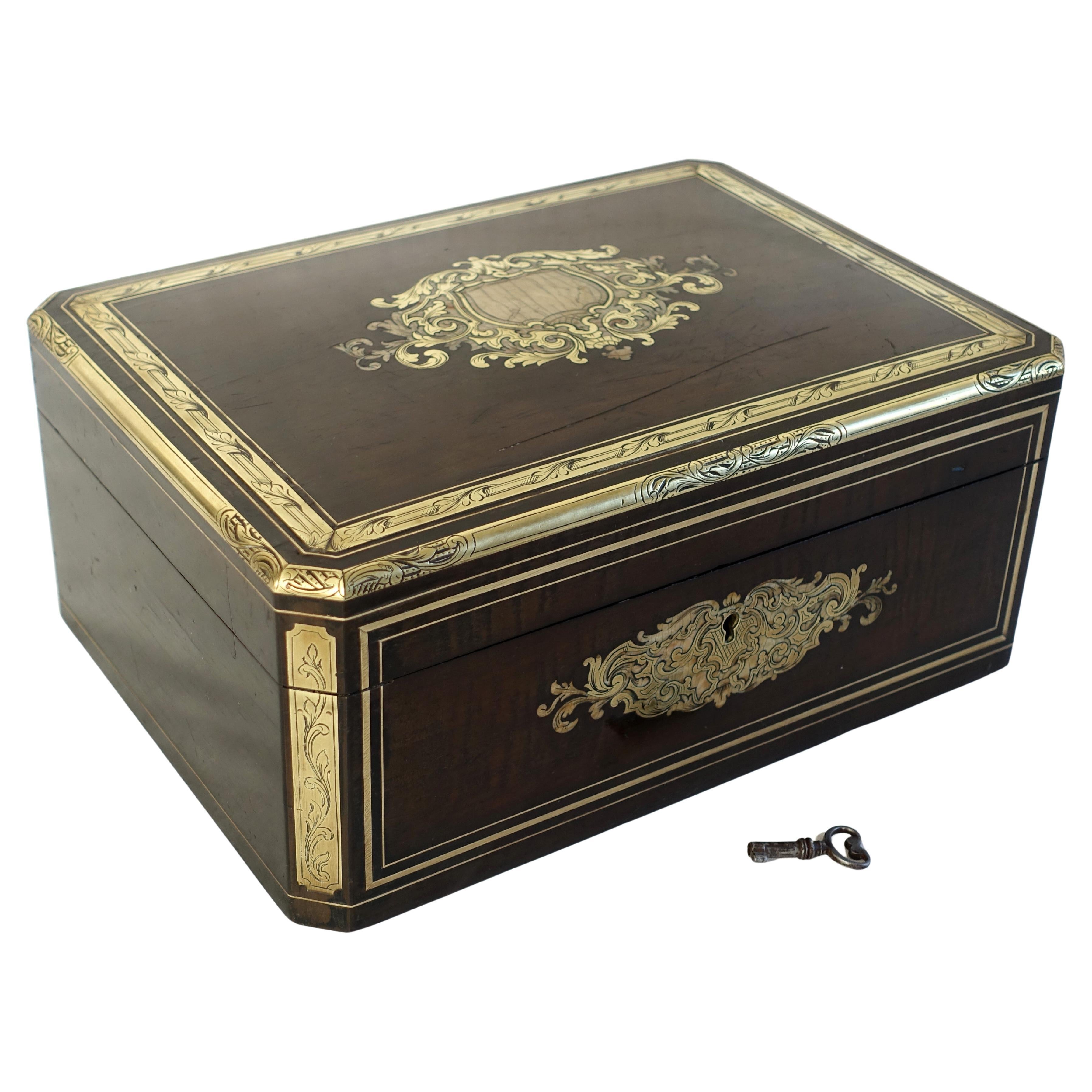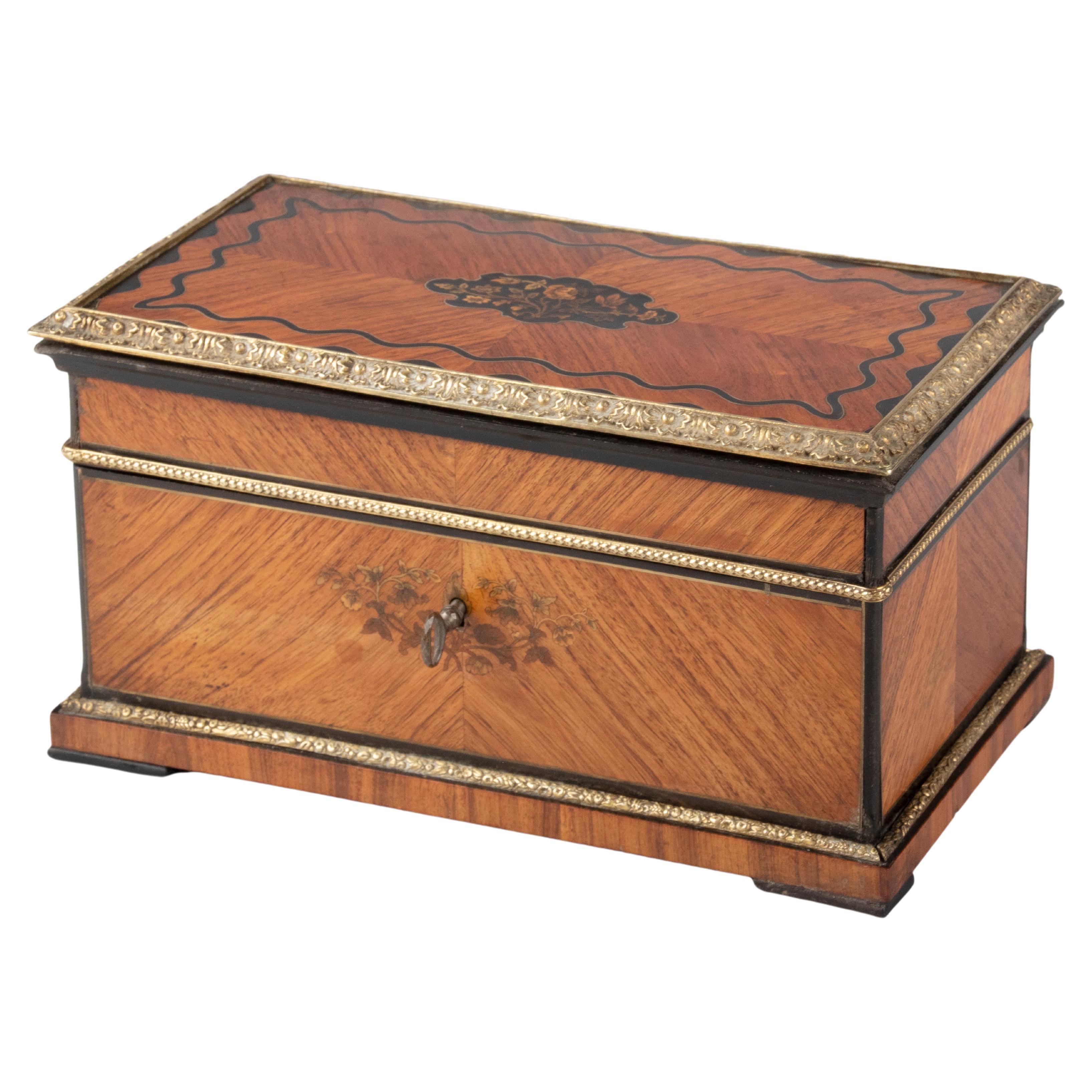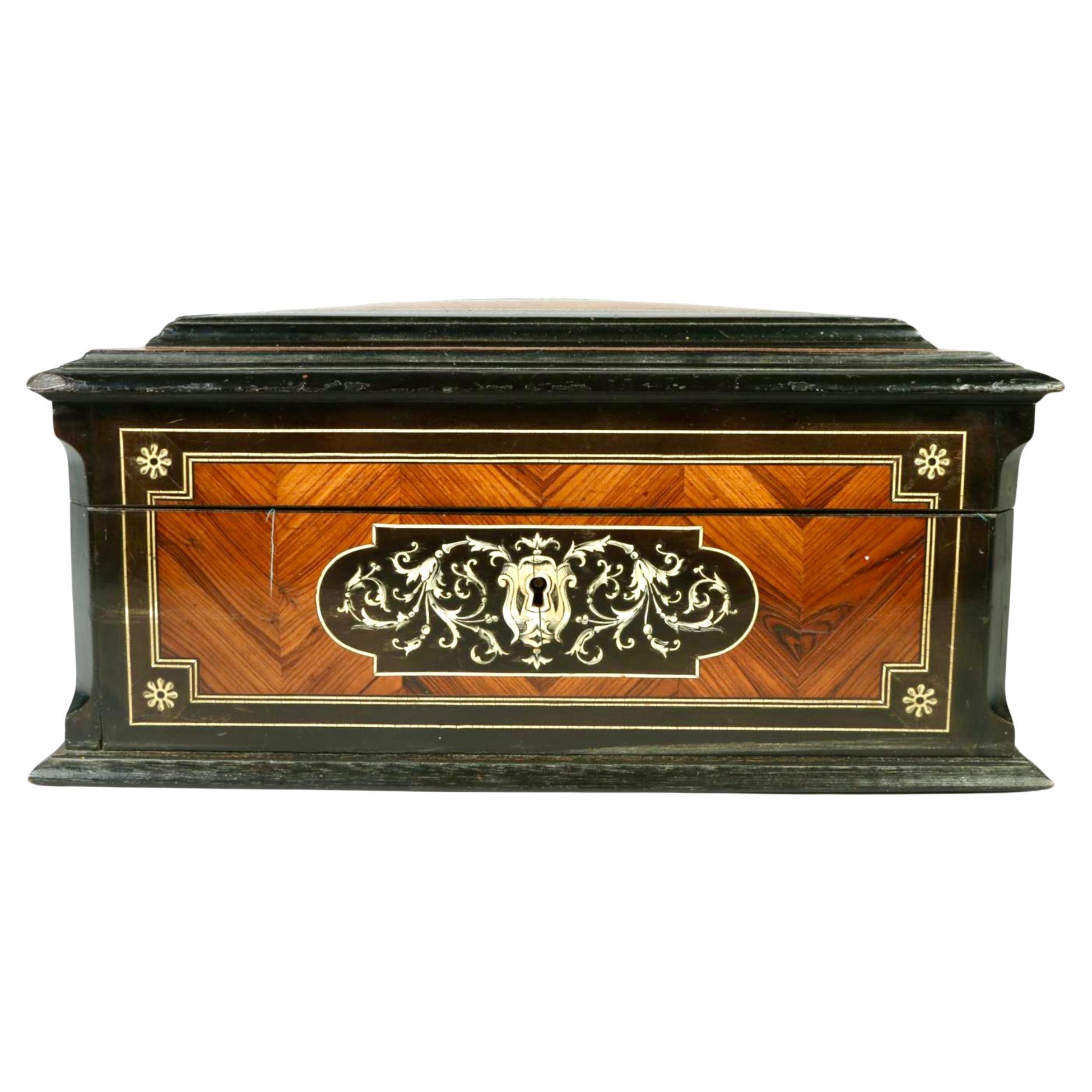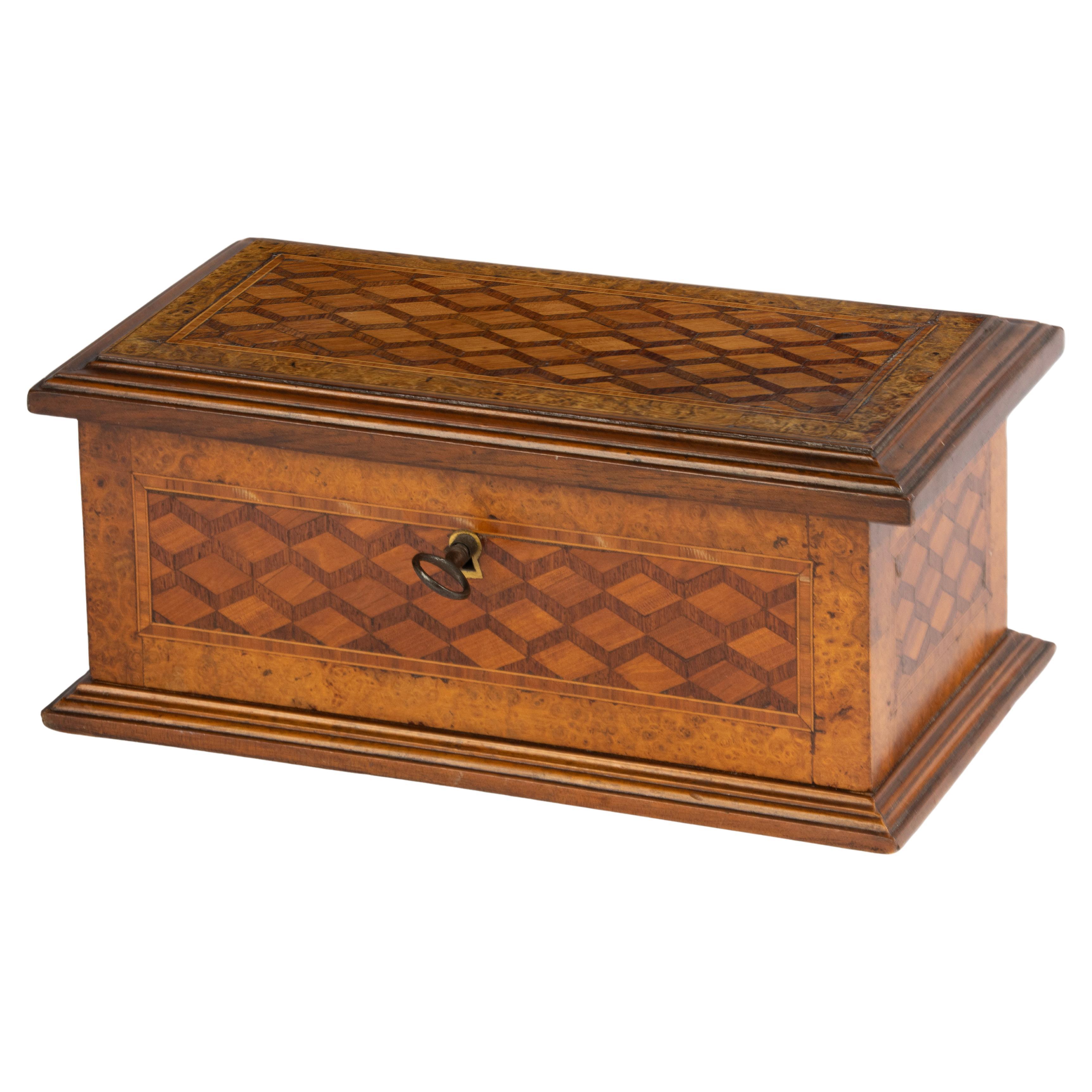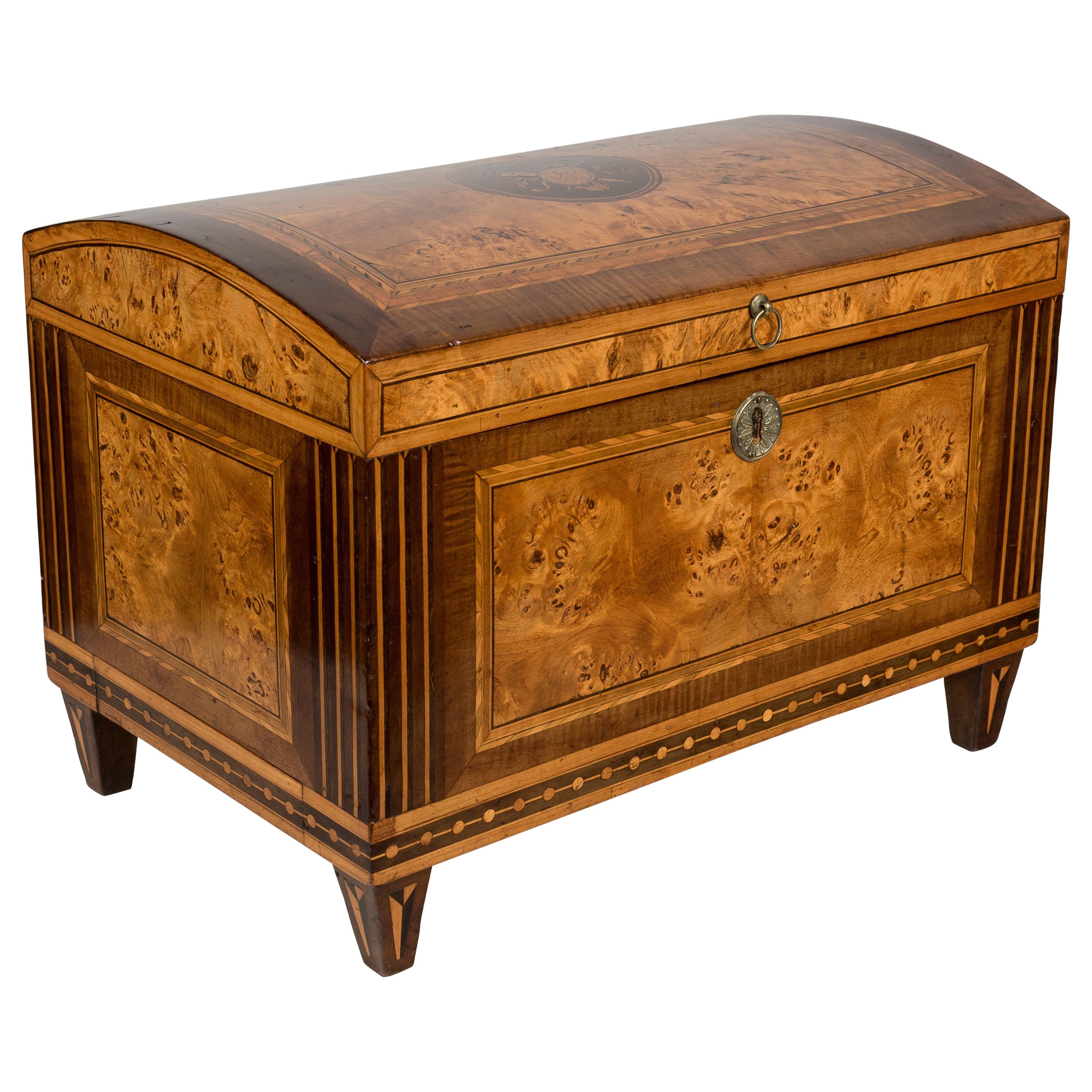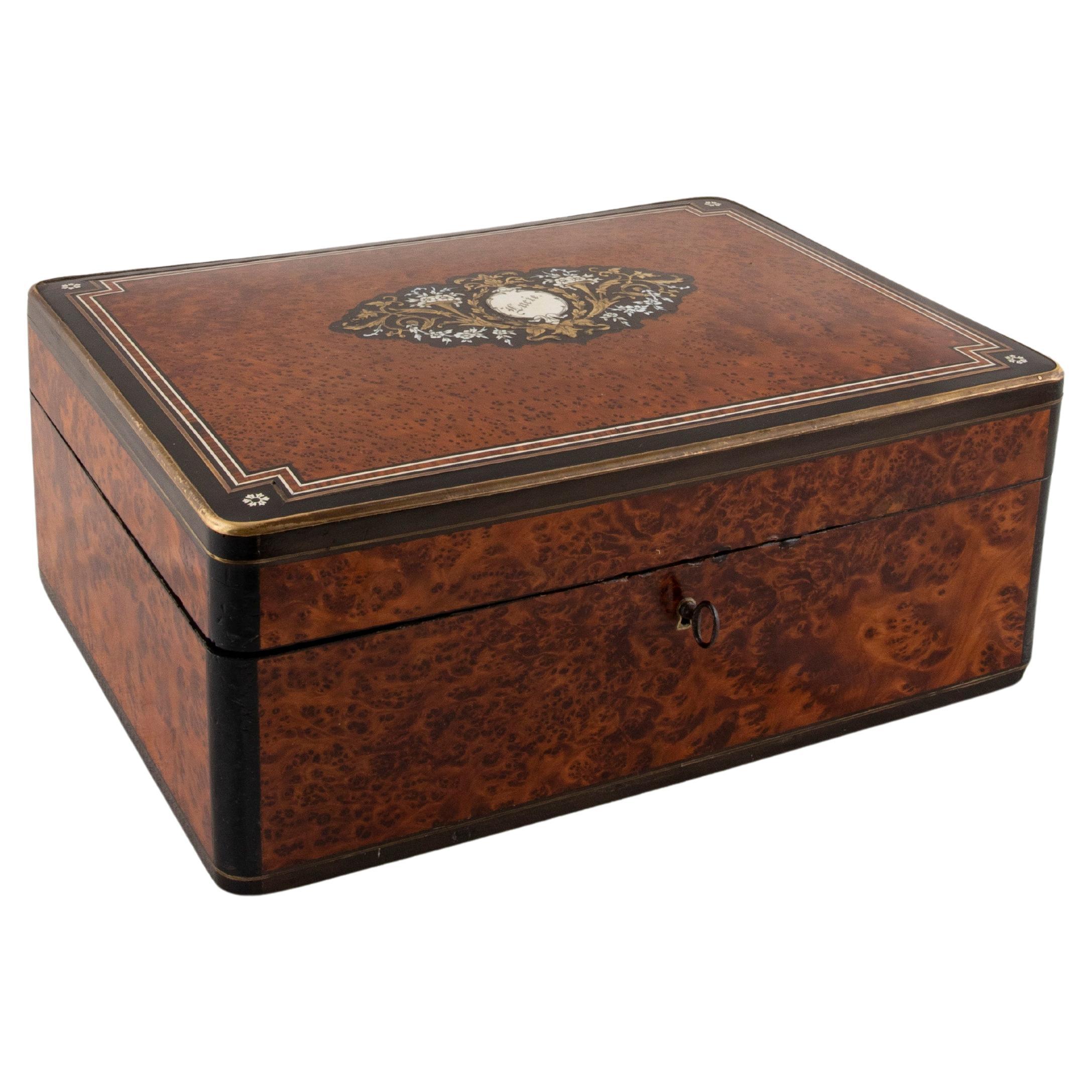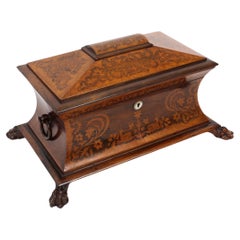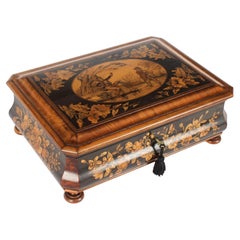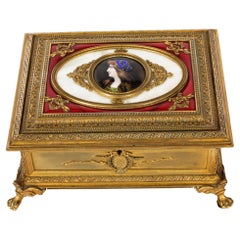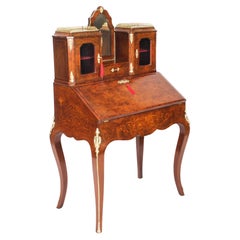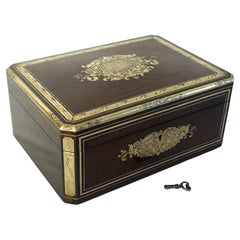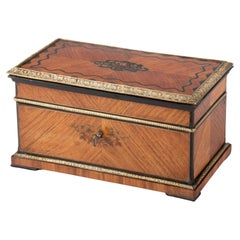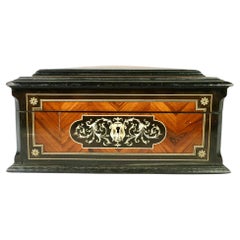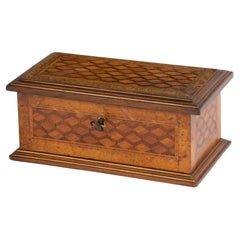Items Similar to Antique French Marquetry and Ormolu Stationary Casket . 19th Century
Want more images or videos?
Request additional images or videos from the seller
1 of 20
Antique French Marquetry and Ormolu Stationary Casket . 19th Century
$1,721.89
£1,250
€1,473.52
CA$2,367.85
A$2,633.28
CHF 1,378.40
MX$32,122.82
NOK 17,320.11
SEK 16,291.80
DKK 10,998.89
About the Item
This is a wonderful antique French Gonçalo Alves marquetry and ormolu mounted casket, circa 1860 in date.
The casket of bureau form has a lift up top and is inlaid with a marquetry flower vase which opens to a plain interior lined with marbled paper, above a single drawer with conforming marquetry front and sides, and raised on a shaped plinth base with decorative acanthus ormolu mounts.
It has fully working locks and is complete with its original key.
This is a highly decorative casket which will make a statement once placed on any period desk.
Condition:
In really excellent condition, please see photos for confirmation.
Dimensions in cm:
Height 21 x Width 30 x Depth 22
Dimensions in inches:
Height 8 inches x Width 1 foot x Depth 9 inches
Gonçalo Alves is a hardwood (from the Portuguese name, Gonçalo Alves). It is sometimes referred to as tigerwood — a name that underscore the wood’s often dramatic, contrasting color scheme.
While the sapwood is very light in color, the heartwood is a sombre brown, with dark streaks that give it a unique look. The wood’s color deepens with exposure and age and even the plainer-looking wood has a natural luster.
Two species are usually listed as sources for gonçalo alves: Astronium fraxinifolium and Astronium graveolens, although other species in the genus may yield similar wood; the amount of striping that is present may vary.
In the high tropical forests of Central and South America, well-drained soils furnish nutrients for a variety of dense, durable hardwoods sought for maritime use, heavyconstruction, and furniture. The Spanish began harvesting in Latin American forests in the early 1500s to provide timber for boatbuilding and repair. By the early 1900s, however, steel ships had replaced wooden ones, and the interest in tropical forests by both Europeans and Americans shifted to appearance-grade woods for furniture.
Although history fails to provide us with a shopping list of species from either harvest period, it's probable that the wood we know today as goncalo alves has always been sought. That's because goncalo alves, considered one of the most beautiful of tropical woods, has a tough reputation, too. Strong and durable, it's used for construction in its homeland and secondarily for fine furniture. Woodworkers elsewhere treasure the wood for decorative items and veneer accents.
Marquetry
is decorative artistry where pieces of material of different colours are inserted into surface wood veneer to form intricate patterns such as scrolls or flowers.
The technique of veneered marquetry had its inspiration in 16th century Florence. Marquetry elaborated upon Florentine techniques of inlaying solid marble slabs with designs formed of fitted marbles, jaspers and semi-precious stones. This work, called opere di commessi, has medieval parallels in Central Italian "Cosmati"-work of inlaid marble floors, altars and columns. The technique is known in English as pietra dura, for the "hardstones" used: onyx, jasper, cornelian, lapis lazuli and colored marbles. In Florence, the Chapel of the Medici at San Lorenzo is completely covered in a colored marble facing using this demanding jig-sawn technique.
Techniques of wood marquetry were developed in Antwerp and other Flemish centers of luxury cabinet-making during the early 16th century. The craft was imported full-blown to France after the mid-seventeenth century, to create furniture of unprecedented luxury being made at the royal manufactory of the Gobelins, charged with providing furnishings to decorate Versailles and the other royal residences of Louis XIV. Early masters of French marquetry were the Fleming Pierre Golle and his son-in-law, André-Charles Boulle, who founded a dynasty of royal and Parisian cabinet-makers (ébénistes) and gave his name to a technique of marquetry employing brass with pewter in arabesque or intricately foliate designs.
Ormolu - Gilt Bronze (from French 'or moulu', signifying ground or pounded gold) is an 18th-century English term for applying finely ground, high-carat gold in a mercury amalgam to an object of bronze.The mercury is driven off in a kiln leaving behind a gold-coloured veneer known as 'gilt bronze'.
The manufacture of true ormolu employs a process known as mercury-gilding or fire-gilding, in which a solution of nitrate of mercury is applied to a piece of copper, brass, or bronze, followed by the application of an amalgam of gold and mercury. The item was then exposed to extreme heat until the mercury burned off and the gold remained, adhered to the metal object.
Our reference: A3376
About the Seller
5.0
Platinum Seller
Premium sellers with a 4.7+ rating and 24-hour response times
Established in 1983
1stDibs seller since 2012
1,386 sales on 1stDibs
Typical response time: <1 hour
Associations
LAPADA - The Association of Arts & Antiques Dealers
- ShippingRetrieving quote...Shipping from: London, United Kingdom
- Return Policy
Authenticity Guarantee
In the unlikely event there’s an issue with an item’s authenticity, contact us within 1 year for a full refund. DetailsMoney-Back Guarantee
If your item is not as described, is damaged in transit, or does not arrive, contact us within 7 days for a full refund. Details24-Hour Cancellation
You have a 24-hour grace period in which to reconsider your purchase, with no questions asked.Vetted Professional Sellers
Our world-class sellers must adhere to strict standards for service and quality, maintaining the integrity of our listings.Price-Match Guarantee
If you find that a seller listed the same item for a lower price elsewhere, we’ll match it.Trusted Global Delivery
Our best-in-class carrier network provides specialized shipping options worldwide, including custom delivery.More From This Seller
View AllAntique George IV Gonçalo Alves & Amboyna Marquetry Tea Caddy C1825 19th Century
Located in London, GB
This is an exquisite antique George IV Gonçalo Alves and amboyna marquetry inlaid tea caddy, circa 1825 in date.
It is beautifully decorated with superb marquetry decoration to the ...
Category
Antique 1820s George IV Tea Caddies
Materials
Amboyna
Antique Italian Sorrento Ware Olive Wood Casket 19th Century
Located in London, GB
A superb antique Italian Sorrento Ware Olive wood and marquetry casket Circa 1840 in date.
The rectangular casket has fabulous inlaid marquetry decoration. It features a floral marq...
Category
Antique 1840s Decorative Boxes
Materials
Wood
Antique Gilt Bronze Jewellery Casket & Limoges Miniature 19th Century
Located in London, GB
This is a beautiful antique Napoleon III gilded ormolu and Limoges enamel jewellery casket, Circa 1870 in date.
The hinged lid having a beautiful finely painted miniature Limoges en...
Category
Antique 1870s French Napoleon III Jewelry Boxes
Materials
Ormolu
Antique Victorian Marquetry & Ormolu Bonheur de Jour Bureau 19th Century
Located in London, GB
This is a beautiful antique Victorian burr walnut and ormolu mounted inlaid Bonheur Du Jour, or Ladies writing desk, circa 1860 in date.
The gorgeous grain and colour of the burr ...
Category
Antique 1860s Desks and Writing Tables
Materials
Walnut
19th Century Victorian Burr Walnut Casket Sewing Box
Located in London, GB
This is a superb quality antique Victorian burr walnut casket, sewing box, with elaborate decorative brass and bronze mounts, circa 1860 in date.
The rectangular lid is beautifully decorated with cut brass mounts centred with a striking bronze sphynx...
Category
Antique 1860s English Victorian Decorative Boxes
Materials
Brass, Ormolu
Antique Victorian Burr Walnut & Inlaid Marquetry Canterbury Magazine Rack 19th C
Located in London, GB
This is a gorgeous antique Victorian burr walnut and marquetry inlaid enclosed Canterbury circa 1870 in date.
The grain of the burr walnut is truly beautiful. It features a hinged...
Category
Antique 1870s Decorative Boxes
Materials
Walnut
You May Also Like
Large marquetry jewelry box or casket, 19th century
By Alphonse Giroux et Cie
Located in GRENOBLE, FR
A fine large marquetry jewelry box : amaranth veneer with brass and mother of pearl inlays ; the inside is upholstered with silk, Napoleon III Parisian production, mid 19th century c...
Category
Antique Mid-19th Century French Napoleon III Jewelry Boxes
Materials
Brass
19th Century Napoleon III Wood Marquetry Teacaddy
Located in Casteren, Noord-Brabant
A refined antique French tea caddy from the end of Napoleon III. The box is beautifully inlaid with different types of wood and brass, outside around ...
Category
Antique 1880s French Napoleon III Tea Caddies
Materials
Brass, Bronze
19th Century French Marquetry Inlaid and Ebonized Wood Box
Located in Bradenton, FL
19th Century Napoleon III precious wood and marquetry Inlaid and ebonized box. Hinged box top features a central motif of fauna and flowers. Inner box is lined with blue satin padded...
Category
Antique 19th Century French Napoleon III Decorative Boxes
Materials
Wood
Late 19th Century Decorative Box - Marquetry Wood - Cubics
Located in Casteren, Noord-Brabant
A beautiful antique decorative box, inlaid with different types of wood.
This type of marquetry work is also called 'Oeben Cubes', named after the famous ebenist Jean Oeben (1721-176...
Category
Antique 1880s French Belle Époque Decorative Boxes
Materials
Wood, Fruitwood, Walnut, Burl
19th Century Italian Marquetry Box
Located in Winter Park, FL
An early 19th century miniature Italian coffer, or hinged box, made of solid walnut with marquetry inlay of various woods and bookmatched bird's-eye map...
Category
Antique Early 19th Century French French Provincial Decorative Boxes
Materials
Birdseye Maple, Walnut
Large 19th Century French Napoleon III Marquetry Jewelry Box, Marked Lucie
Located in Fayetteville, AR
This large mid nineteenth century marquetry box from the Napoleon III period features a burl thuya wood field surrounded by a concentric border of intricately inlaid ebonized pearwoo...
Category
Antique Mid-19th Century French Napoleon III Jewelry Boxes
Materials
Bronze
More Ways To Browse
Solid Gold Box
Italian Wooden Boxes
Flower Box Metal
French Brass Ormolu
European Wooden Boxes
1500s Furniture
Latin America Antique
Antique Marbled Paper
Marquetry Bureau
American Marquetry
Antique Stationary
Early 19th Century Bureau
Marble And Brass Box
Spanish Marquetry
Antique Boulle
Antique French Ormolu Box
18th Century Marble Vases
Gilt Casket
